Randy Alcorn's Blog
November 28, 2025
Sometimes Happiness Requires Adjusting Our Expectations: An Interview on Happiness and Giving

In this first part of an (edited) interview I did with Follow the Money, we covered the topics of happiness, and living as a believer in a hostile culture.
Question: In Happiness, you provide scriptural evidence that Christians should be happy. In fact, we’re supposed to, as the book cover suggests, radiate joy, peace, and contentment so that others are naturally drawn to what we have. And yet, in today’s culture, the vast majority of Christians are perceived as angry, judgmental people who don’t seem to derive any joy from life. Randy, what did you learn from your research? Why aren’t Christians happy?
Answer: I think often we’re not happy as Christians because our expectations are skewed. We believe the health and wealth gospel message that says if you follow Jesus, all will be well with you. God almost becomes a personal genie who fulfills your wishes (which are referred to as prayers). Whatever you pray for, you’ll get. All you need is enough faith. Then pretty soon, it’s not faith in God, but faith in your faith. And it involves convincing yourself by repeating certain slogans and using Scripture as if they were magical formulas rather than the revealed Word of God.
The true biblical worldview is ultimately very optimistic. The glass isn’t half empty; it’s half full, with the promise that one day it will be completely full—in fact, overflowing for all eternity. Now that is very optimistic! But we’ve got to recognize that the glass which is currently half full is indeed half empty because of the fall, sin, and the curse. If you’re expecting life right now to be easy and always go your way, you’re going to be very disappointed. So I think a number of Christians aren’t happy because they have unrealistic expectations for their present lives. Many who think they are trusting in Jesus are trusting more that He will give them a smooth, easy, successful, dreamy life.
Another problem is that in the Church, we’ve been told we’re not supposed to be happy. As the story goes, the world has this thing called “happiness,” and it’s shallow and superficial. It’s what you have at a ballgame or a BBQ, or only when your circumstances are going well for you. Supposedly, Christians have “joy” but we define it differently than the Bible, because we think of joy as something unemotional and transcendent and completely different than happiness.
It’s as if some Christians think, “I may be a fairly miserable, critical person who merely tolerates my neighbors. And I might be the first to complain and be ungrateful. But deep down inside, I have the joy of Jesus in my heart.” Well, if you have joy inside, it’s going to make its way to your face! People are going to see that there’s really something to your relationship with Jesus. Real joy has to have some form of happiness and gladness, because they’re synonyms and all connected. That joy is also going to result in gratitude. If it doesn’t, people aren’t going to see the happiness of God or the appeal of Jesus Christ, and what Scripture calls “the good news of happiness.” That’s literally what Isaiah 52:7 calls the gospel in the ESV and the NESV, two of the most literal translations.
Question: How does your view about happiness differ from the health and wealth gospel?
Answer: What Scripture teaches about happiness is emphatically different than the health and wealth gospel. There are people who say, “If you’re talking about happiness now, you’re getting into the prosperity gospel.” Not at all! Scripture talks about a number of things that are abused in concept. In fact, even the word “love” is tremendously misused. Think of all the popular music where “love” means basically fornication or adultery. So do we say love is a bad word we shouldn’t use? Perhaps we shouldn’t say “For God so loved the world” anymore? Of course not! Instead, we explain what Scripture means by “love.”
The word “happiness” can also be misused, but don’t throw out the baby with the bathwater. It’s a good word, historically. The Puritans used it all the time. So did Charles Spurgeon, John Wesley, and many others, to speak of happiness in Christ.
Scripture simply does not promise the many things that are guaranteed today by prosperity preachers. It never promises we won’t face trials. In fact, it promises that we will experience trials, and that God will bring Christlikeness out of them. First Peter 4 says, “Don’t be surprised, brothers, at the fiery ordeal you are experiencing as though something strange were happening to you.” The godly in Christ Jesus will suffer persecution. Jesus said in John 16:33, “In the world, you will have tribulations, but be of good cheer. I’ve overcome the world.”
If prosperity theology were true, then Jesus and probably the apostle Paul should have made the short list for those living the easiest, healthiest, and wealthiest lives. Instead, Jesus talks about not having a place to lay His head. Obviously, He was not in abject poverty, but He was dependent upon the support of other people. As He traveled, He didn’t own much of anything except maybe His clothes.
Also, Paul talks in 2 Corinthians 11 about all of the suffering he’s undergone, and in chapter 12, he talks about his thorn in the flesh. He had a physical ailment of some sort, and he asked the Lord to remove it three times, and God did not. He said, “My grace is sufficient for you. My strength is made perfect in weakness.” God used a lack of health to accomplish a higher purpose in Paul’s life.
Does God ultimately promise us health and wealth? Yes, in the resurrection, when we live on the New Earth. But let’s not lay claim to something now that God has promised us for the future glorified state, where we will live with Him forever as resurrected beings.
Question: You brought up the concept of suffering. Throughout the New Testament it’s clear that if we are faced with adversity, including persecution, we are to count it all joy. But today, Christians organize against anyone who dares to, in any way, not accommodate them. For example, during the Christmas season, people have been extremely upset that for-profit secular companies were not saying Merry Christmas. Instead, they were saying Happy Holidays. This turned into an argument that they were being persecuted. Instead of counting it all joy, we’re setting up legal defense funds. What’s the proper response to that?
Answer: Again, it goes back to expectations. We’re expecting the world to go along with what we believe from the Bible: who Jesus is, the truth of the gospel, and salvation by grace through faith. But the world, by definition, does not embrace God’s truth. It’s always odd to me when Christians expect the culture to be faithful to Scripture. Of course it isn’t! Why would we be surprised by that? Think of the early Church, living amidst Roman culture’s skewed views of human sexuality, life, and wealth. It was not biblically based or Christ-centered.
I think we’ve told ourselves that’s different because we are Americans, and America is a Christian nation. But America has not been a Christian nation for a long time. I’m not saying it never was, although it never was completely, of course. All along, many people were not believers, but there were also many genuine followers of Jesus, including some in positions of leadership. There was a common appreciation for the wisdom of Scripture and for Judeo-Christian morality. (Look at all the monuments in Washington, D.C. that have Scripture on them!) Yes, that’s part of our heritage, but when people are trying to reclaim America as a Christian nation, the point is that it is just simply no longer the case. There are people who might have general Christian morals, but they are fewer and fewer in number.
Sometimes people who live in the Bible Belt perhaps get the idea that America is uniform across the nation. But when you live in the Pacific Northwest like I do, you’re under no illusion whatsoever that you are part of a Christian culture! Very few people here go to church. I met a brother from Africa who told me that when he first came over from Africa, he lived in the Dallas, Texas area. Now he lives in Oregon, and at first he started asking people what church they go to. In Dallas, no one ever looked at him strangely, because most people there have some sort of church affiliation. They may not even be Christians, but they are loosely connected with a church, and they’re not embarrassed about it. But when he asked people up here in the Portland area, “What church do you go to?” some of them were offended. They would say, “What makes you think I go to church?”
Question: You have more dogs than evangelicals in the Pacific Northwest, right?
Answer: Yes, I would say way more! The truth is, we’ve gotten accustomed to this idea that the world, and especially the American culture, is supposed to just go along with the Christian faith. But throughout history, the great majority of places have been antagonistic to Christianity. Cultures, ultimately, can’t be Christian. Individuals can be Christians, and those Christians can influence culture, but unfortunately, my observation is that sometimes Western Christians end up complaining about culture instead of influencing it. Then, ironically, we marginalize ourselves when it comes time to declare the gospel. Nobody’s drawn to what we believe because we’re fighting people about whether we should legally require Starbucks to say “Merry Christmas” on their cups. That actually was a thing several years ago! I mean, really? How much better if instead we seek to be full of grace and truth, like Jesus, pointing others toward Him and His offer of salvation!
Recommended Reading
 Happiness (softcover)
Happiness (softcover)  If God Is Good (Paperback)
If God Is Good (Paperback) 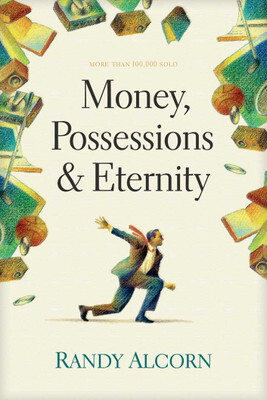 Money, Possessions and Eternity
Money, Possessions and Eternity
November 26, 2025
Entering the Holiday Season with Both Grief and Thanksgiving

The holiday season is challenging, here in my fourth year without Nanci: first there’s Thanksgiving Day, quickly followed by Nanci’s birthday on November 30. Then there’s December 7, the anniversary of the day we met (on a blind date!) in 1968 as freshmen in high school, and after that, Christmas. There’s New Year’s Eve and then Valentine’s Day and then March 28, the day of Nanci’s homegoing. From then till the next Thanksgiving, the anniversary dates are piled on each other.
On Thanksgiving I will go to my youngest daughter Angie’s house. Her younger son Ty recently got engaged to Ava, whom I adore, and Ava’s family will be joining us too. So will grandson Jake and his wife Richie, whom I also adore! Jake and Ty are great—and so are Matt, Jack and David, my California grandsons. But I commend Jake and Ty for their excellent choices of Richie and Ava! I now have two wonderful granddaughters, who both call me Pops, and I know Nanci already loves the two of them from a distance. Of course, I look forward to possibly having more granddaughters in the future!
This Sunday, Angie’s husband Dan, recently installed as a lead pastor, will preach his first sermon as a pastor of Cornerstone Church in Gresham. (Am I the only person who thinks the term “installed” is weird when used of a pastor, but right on target when used of locks, apps, computer programs, smoke alarms, refrigerators, washers, and dryers?) I’ll join them at church, and since Sunday is Nanci’s birthday, afterwards we’ll have lunch to celebrate her. I love that Angie planned this time for us to be together in Nanci’s honor. I will greatly miss my daughter Karina, her Dan (also a pastor, and I assume he was once installed too), and their boys Matthew, Jack and David.
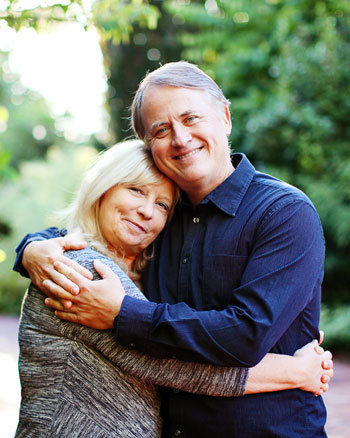 When people ask, I honestly say that I’m doing well. I miss Nanci, and some days are rough—especially when I’m with people we used to hang out with and laugh with, and Nanci‘s laugh was the loudest and most contagious and her absence is so conspicuous. Not that I don’t laugh anymore, because I do, with friends, people at church, my small men’s group, and our dog Gracie when she is being hilarious! (Such as when she looks the other way and pretends total disinterest in the food I put in her bowl, but when I leave the room and come back the food is gone, while she is on the couch with eyes shut, just as she was when I left.)
When people ask, I honestly say that I’m doing well. I miss Nanci, and some days are rough—especially when I’m with people we used to hang out with and laugh with, and Nanci‘s laugh was the loudest and most contagious and her absence is so conspicuous. Not that I don’t laugh anymore, because I do, with friends, people at church, my small men’s group, and our dog Gracie when she is being hilarious! (Such as when she looks the other way and pretends total disinterest in the food I put in her bowl, but when I leave the room and come back the food is gone, while she is on the couch with eyes shut, just as she was when I left.)
I feel profoundly sad sometimes, yet so deeply grateful for the life God gave Nanci and me together, and it is impossible to be this grateful without also being happy. This is 2 Corinthians 6:10, “we are sorrowful yet always rejoicing.”
I really miss our conversations, enjoying sports and movies together, etc. But the only way to avoid grief is to avoid love, and I’ll take the grief any day over having to give up my vivid memories of our beautiful life, flawed of course, but also wonderfully redemptive. Reunion awaits, and I think about it every day. Meanwhile, I want to serve our King faithfully and finish well.
Ephesians 5:18-20 says, “Be filled with the Spirit, addressing one another in psalms and hymns and spiritual songs, singing and making melody to the Lord with your heart, giving thanks always and for everything to God the Father in the name of our Lord Jesus Christ.” Being Spirit-controlled is inseparable from giving thanks in everything.
Whether we find ourselves having reason to celebrate or to mourn, there’s never a time not to express our gratitude to God. Psalm 140:13 declares, “Surely the righteous shall give thanks to your name.” Giving thanks is what God’s people do.
If you also find yourself grieving this holiday season, I pray that God’s constant presence will comfort you. Whatever we face, we can always embrace gratitude for what Christ has done for us. That’s a choice we can consciously make, and one which I seek to do continuously.
May you have a Christ-centered, full-of-gratitude Thanksgiving with those you love, even if some you love are, for now, far away.
Recommended Reading
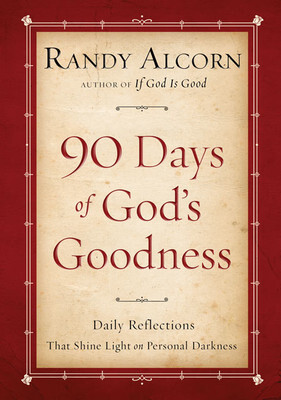 90 Days of God's Goodness
90 Days of God's Goodness 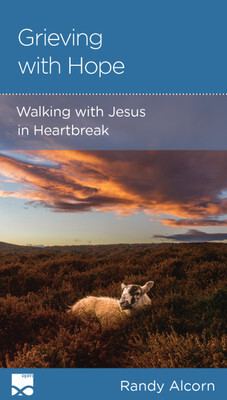 Grieving with Hope
Grieving with Hope
November 24, 2025
Planning for the Gospel to Be Shared at Your Memorial

A reader left this comment on my Facebook:
I have left instructions with my executor to have a copy of the small pocket-sized version of Heaven available to anyone who attends whatever type of memorial I have.
Over the years I’ve done many memorial services. It’s true that in the wake of a loss, people’s hearts and minds are often open to hearing what really does happen on the other side of death.
 The Heaven booklet has been widely used at funerals and memorial services. Some churches, including my own, make it available at every memorial service. Sometimes it’s handed out at the door; sometimes it’s placed on the seats or pews. When the person’s death was tragic and troubling, my booklet If God Is Good: Why Do We Hurt? Is also used. Unbelievers and believers alike struggle with the problem of evil and suffering. As I do in the Heaven booklet, in If God Is Good, I share the good news of salvation in Christ.
The Heaven booklet has been widely used at funerals and memorial services. Some churches, including my own, make it available at every memorial service. Sometimes it’s handed out at the door; sometimes it’s placed on the seats or pews. When the person’s death was tragic and troubling, my booklet If God Is Good: Why Do We Hurt? Is also used. Unbelievers and believers alike struggle with the problem of evil and suffering. As I do in the Heaven booklet, in If God Is Good, I share the good news of salvation in Christ.
I encourage you to consider leaving instructions in your will for the gospel to be clearly shared at your memorial, and for Christ-centered material to be given to those in attendance. (It certainly doesn’t have to be the Heaven booklet! There are many wonderful books or booklets that could be shared.)
Another idea is to share my booklet Grieving with Hope, which provides an eternal perspective to those struggling with grief. A reviewer kindly wrote:
Randy shares personal observations of what he experienced when his wife, Nanci, passed. Everyone who faces a loss of a loved one will experience “What will my future be like without my loved one?” and the deep sorrow from shock and pain of their passing. Randy reminds and encourages those who are grieving that we have a God who is faithful, loving, and kind and He is with us as we walk the journey of grief. Randy shares very practical and helpful information about stages of grief, but more importantly, he gives scriptural references of how we can grieve with hope. I am grateful to provide this booklet to the members of our Grief Share class.
Far from morbid, planning your own memorial service can be wise, since death is life’s greatest certainty. But for those who love Christ, death is not an end—it’s a transition that will bring us face to face with our Creator.
I’ve often read at memorial services this depiction of a believer’s death:
I’m standing on the seashore. A ship at my side spreads her white sails to the morning breeze and starts for the blue ocean. She’s an object of beauty and strength and I stand and watch her until, at length, she hangs like a speck of white cloud just where the sea and the sky come down to mingle with each other. And then I hear someone at my side saying, “There, she’s gone.”
Gone where? Gone from my sight, that is all. She is just as large in mast and hull and spar as she was when she left my side. And just as able to bear her load of living freight to the place of destination. Her diminished size is in me, not in her.
And just at the moment when someone at my side says, “There, she’s gone,” there are other eyes watching her coming, and there are other voices ready to take up the glad shout, “Here she comes!”
And that is dying.
We see life differently when we realize that death is a small obstacle that marks a great beginning. What a gift to pass on that perspective, and the hope of Jesus, to those who will grieve our absence in this present world.
Recommended Reading
 Grieving with Hope
Grieving with Hope 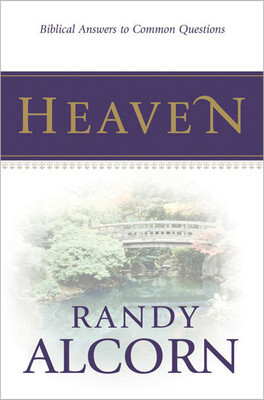 Heaven Booklet (20-Pack)
Heaven Booklet (20-Pack) 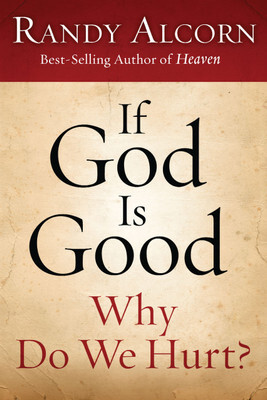 If God Is Good Booklet (10-Pack)
If God Is Good Booklet (10-Pack)
November 21, 2025
Do You See Eternity?

When I was a brand-new believer in the 1970s, many Christians eagerly listened to Bible teachers “proving” from Scripture that Christ would return in the 1980s. The Late Great Planet Earth told us the fig tree in Matthew 24:32–35 was Israel, and the generation that witnessed Israel’s return as a nation in 1948 wouldn’t pass away before Christ’s return. Convinced of this, one of my friends didn’t get dental work done, saying, “Why spend the money when Christ is going to come back within a couple of years?” (He ended up regretting it!)
Years later, as a pastor, I hesitated before preaching on Christ’s second coming because I was weary of the prophecy obsession, which was less about Jesus than endless speculation about the tribulation, the antichrist, the USSR being Gog and Magog, the Chinese army preparing for Armageddon, the locusts of Revelation 9 being helicopters—and so on.
Yet a healthy emphasis on Christ’s return is vital for believers, since “our citizenship is in heaven, and from it we await a Savior” (Philippians 3:20). Christ will appear “to save those who are eagerly waiting for him” (Hebrews 9:28), and He will reward “all who have loved his appearing” (2 Timothy 4:8).
Scripture calls His return “the happy fulfillment of our hope” (Titus 2:13 NET). The hope in view is not wishful thinking but rock-solid, blood-bought certainty. Since Christ’s return is the believer’s great hope, we should ask ourselves: What will it mean when He does return?
That Happy Day
It’s not essential that we understand in detail how the future will fall together. But the cornerstone of all orthodox eschatology is belief in the second coming of Christ—His physical return to this earth.
Preaching on the second coming, Charles Spurgeon said, “To stand star-gazing at the prophecies, with your mouth wide open, is just the wrong thing; far better will it be to go on working for your Lord, getting yourself and your service ready for his appearing, and cheering yourself all the while with this thought, ‘While I am at work, my Master may come. Before I get weary, my Master may return.’”
The imminent return of Christ means He can return soon, within short order, as has been true for two thousand years. It also means He does not have to return when we think (1 Thessalonians 5:1–3). As Jesus Himself said, “The Son of Man is coming at an hour you do not expect” (Matthew 24:44).
Unless Christ returns in our lifetime, we’re all going to die. In God’s perfect timing, He will take each of us out of this fallen world. Then, at the appointed time, He’ll send His Son back to set up His kingdom and initiate a resurrection of believers for eternal life on the New Earth. How grateful we are for God’s promise of resurrected bodies and renewed minds, with which we will be better able to glorify Him by enjoying Him forever!
John Calvin wrote, “Let us not hesitate to await the Lord’s coming, not only with longing, but also with groaning and sighs, as the happiest thing of all. He will come to us as Redeemer” (Institutes 3.9.5).
That will be the day when everything changes.
Only the Beginning
Our interest in the end times often extends to the period preceding and immediately following Christ’s return. But while His return will be unspeakably wonderful, it will end quickly. What will not end is our ongoing, ever-deepening relationship with Jesus. It will get richer and richer, day after day, for “in your presence there is fullness of joy; at your right hand are pleasures forevermore” (Psalm 16:11). And as we wait for Jesus above all, we can also long for our eternal home: “According to his promise we are waiting for new heavens and a new earth in which righteousness dwells” (2 Peter 3:13).
A woman engaged to a man living far away joyfully anticipates the day he will return for their wedding, an event that will change their lives. The same is true for us, the corporate bride of Christ, as we await His return. Yet a wedding, wonderful as it is, is only the beginning. I recall my wedding with great fondness, but when I consider the 54 total years of knowing Nanci and our 47 years of marriage, I can say that among the countless memories we shared, only a sliver of them are from our actual wedding day.
Likewise, the return of Christ is not just an explosive event that ends history but one that begins a new history and removes the curse, such that we will never again be hindered in our relationship with Jesus. “When Christ who is your life appears, then you also will appear with him in glory” (Colossians 3:4). We will experience the ongoing, daily revelation of His person as we live in His direct presence.
Best of all, once He returns, He will never leave us again.
Face-to-Face with Our Bridegroom
When you are in love, you desire to be in your beloved’s presence. Where you go and what you talk about are secondary to the joy of simply experiencing life together. The same will be true of life in the direct presence of Jesus, our true Bridegroom and best Friend.
I sometimes ponder what it will be like to see Jesus face-to-face, to fall on my knees before Him, and then to talk and eat and walk with Him as a resurrected person living on a resurrected earth. Like Job, I’m struck with the realization that “I myself will see him with my own eyes — I, and not another. How my heart yearns within me!” (Job 19:27 NIV).
Sometimes we imagine too much when it comes to eternal life. But usually, the problem isn’t that we imagine; it’s that what we imagine can be biblically ungrounded. We fail to picture in our minds the realities that Christ reveals to us in His word. Rather than ignore our imagination, I believe we should fuel it with Scripture, stepping just through doors the Bible opens.
We only look forward to what we can imagine. So do imagine what it will be like on the New Earth to walk with Jesus, as the first disciples once did. Living in Christ’s presence will be the ultimate fulfillment of the abundant, overflowing life God promised.
In the meantime, many unanswered questions remain. For instance, how will every eye see Him when He returns (Revelation 1:7)? Or how will untold millions of believers on the New Earth be able to talk and walk with Jesus one-on-one? Will we take turns enjoying His bodily presence? Or will the one body of Jesus somehow be simultaneously present with His people in a million places? The questions abound, but what we know is that God is capable of doing far more than we imagine.
All that will surround us on the New Earth—the people, banquets, work, culture, arts, sciences—all of it will point us toward Jesus. Though we’ll always be finite, we will continue growing in our knowledge of the infinite God. In the coming ages, He will show us “the immeasurable riches of his grace in kindness toward us in Christ Jesus” (Ephesians 2:7). What will we learn about Him as we worship with the four living creatures (Revelation 7:11)? What will we learn from angels (Revelation 5:11), and what might they learn from us? What insights will we glean from the animals on the New Earth (Isaiah 11:6–9; 65:25)?
As we look into the faces of people and angels and animals, we’ll see the myriad ways our Creator has revealed himself to us. We will forever progress in the depth and breadth of our relationship with Jesus—first, directly with Him; second, through other living beings and the fascinating new world that He will create. Our entire lives will be centered on Him, and we will learn more about Him through the countless adventures that await us.
Come, Lord Jesus
Jesus will return after the last martyr is killed (Revelation 6:11), the last convert converted. But “concerning that day and hour no one knows, not even the angels of heaven, nor the Son, but the Father only” (Matthew 24:36). As we wait, we’re to serve Him faithfully, trusting Jesus to return when He deems it good to do so—whether that’s within our lifetime or hundreds of years from now.
Meanwhile, we fully place our hope in Christ and His promises. He will return, and we will be resurrected to life on the New Earth, where we will behold God’s face and joyfully know and serve Him forever.
So, eyes lifted upward, together we say, “Come, Lord Jesus!”
Recommended Reading
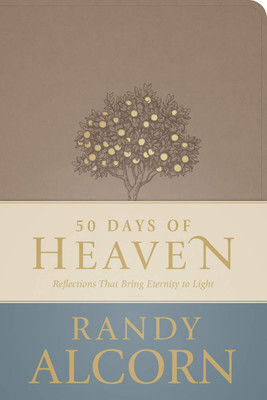 50 Days of Heaven (Special Edition)
50 Days of Heaven (Special Edition) 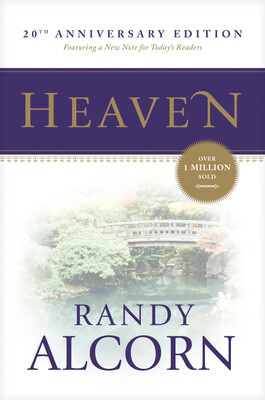 Heaven
Heaven  The Promise of the New Earth
The Promise of the New Earth
November 19, 2025
The Christian Worldview Is Both Comprehensive and Satisfying

We live in a post-Christian era. Among Westerners, especially, the Christian worldview is increasingly unpopular. Non-Christian worldviews are winning the public relations war, replacing Christianity’s seemingly old and repressive way of thinking with more positive, progressive, and inclusive ideologies. People suppose the Christian faith has been tried and found wanting, when in fact, to paraphrase G. K. Chesterton, they have been repeatedly told it’s wanting and therefore have never tried it.
Popular culture, despite its shallowness, has a far-reaching influence on the average person’s worldview. This entertainment-driven and self-gratification-obsessed blend of pop psychology, pop philosophy, and pop theology has become its own worldview. Never have people needed to hear the biblical worldview more—and perhaps never have they been more culturally conditioned to dismiss it.
The fact that there are fewer nominal Christians today is good. It’s better for people to deny the Christian faith outright than to profess it in weak and shallow ways. Many have become immune to Christianity by contracting a mild and unbiblical form of it. Some find, as C. S. Lewis did, that after getting far enough away from a false Christianity, they can see with fresh eyes what true Christianity is—a dynamic and persuasive competitor in the marketplace of ideas.
Everyone has a worldview, inconsistent and superficial though it might be. Non-Christians often raise concerns about evil and suffering as if they present a problem exclusively for the Christian worldview. But every worldview must attempt to account for them. As I have compared the Christian worldview to others, I have found it both comprehensive and satisfying. I believe the greatest test of any worldview is how it deals with the problem of evil and suffering. And Scripture’s redemptive story passes that test with remarkable depth and substance.
Having grown up in a non-Christian home, and still vividly remembering my unbelief as a young teenager, I’m convinced that Christianity’s explanation of why evil and suffering exist beats that of any other worldview. Its explanation of why we can expect God to forever deliver His redeemed people from evil and suffering is better still. The answers revealed in Scripture not only account for how the world is, they offer the greatest hope for where the world is headed.
The Bible confirms evil’s existence and considers all of God’s attributes as infinite. Joni Eareckson Tada writes, “God permits what he hates to accomplish that which he loves.” Evil is never good, yet God can use any evil to accomplish good and sovereign purposes.
The problem of evil lies at the very heart of the biblical account and serves as the crux of the unfolding drama of redemption. The first act of human evil moved God to bring decisive judgment while simultaneously unveiling His master plan. To complete our redemption—as well as that of the entire fallen creation—He sets in motion His strategy of incarnation, atoning death, resurrection, and ultimate return.
The Bible never sugarcoats evil. Jesus called an entire generation “evil” (Matthew 12:39, KJV). We are to pray, “Deliver us from evil” (Matthew 6:13, KJV), not simply, “Help us face tough times.” Scripture tells us, “Do not be overcome by evil, but overcome evil with good” (Romans 12:21). One day the Judge will say, “Away from me, all you evildoers!” (Luke 13:27).
The Christian worldview concerning this central problem is utterly unique. When compared to other belief systems, it is singularly profound, satisfying, and comforting. In fact, in the end, I’m convinced the Christian worldview is the only one that adequately deals with evil and suffering.
Through the redemptive suffering of Christ—in which He took all human evils on Himself—and through His triumph over evil and death, God has done everything necessary to defeat evil. One day He will carry out His final redemptive work: “He will swallow up death forever. The Sovereign LORD will wipe away the tears from all faces; he will remove the disgrace of his people from all the earth. The LORD has spoken” (Isaiah 25:8).
How does your own worldview stack up against the real world around you? Does it credibly explain the way things are and offer persuasive reasons for believing in a hopeful future? Or do you need to revise or abandon it in order to embrace the biblical worldview because it better explains your condition and that of the world around you?
Recommended Reading
 90 Days of God's Goodness
90 Days of God's Goodness  If God Is Good (Paperback)
If God Is Good (Paperback) 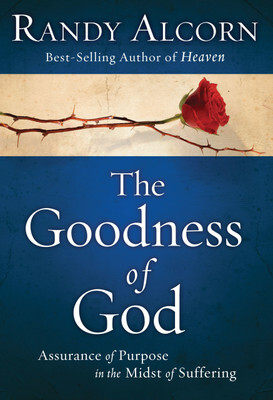 The Goodness of God
The Goodness of God
November 17, 2025
It’s Impossible to Outgive God

Note from Randy: God is the greatest giver in the universe, and He won’t let you out give Him. This is not prosperity theology. It is simply the way our generous God delights to work in the lives of His children.
R. G. LeTourneau invented earthmoving machines and gave away 90 percent of his income, but the money came in faster than he could give it away. LeTourneau said, “I shovel it out and God shovels it back—but God has a bigger shovel!”
Now, I don’t mean that always happens in such extremes, or that you’ll never feel your sacrifice when you give (it wouldn’t be a sacrifice if you didn’t), but Scripture is emphatic on the point that God honors His children’s giving. That’s why I love this article from Desiring God’s David Mathis, reminding us that we just can’t outgive our generous God.
Just Try to Outgive Your God
By David Mathis
Give, and it will be given to you. Good measure, pressed down, shaken together, running over, will be put into your lap. For with the measure you use it will be measured back to you. (Luke 6:38)
We have an ice cream shop in town that is known for its laughable generosity. Order a “child size,” and you get more than enough for two adults. First-time visitors are not just pleased but stunned to see the teenage workers pile scoop after scoop on the base of a tiny cone, press it down, and keep adding — until the tower topples into an accompanying cup.
It’s a good shock, the kind that starts with a smile and then leads to laughter. I am getting so much more than I expected!
God Does the Scooping
Jesus serves up just such a picture of over-the-top generosity in Luke 6:38. And the surprise isn’t that his followers are asked to go around behind the counter and do the dishing, but that Jesus puts the scoop in the hand of his Father. He promises that “the Most High” rejoices to give lavishly to his lowly children until they smile and laugh with joy in return.
Delighting in Jesus’s picture, J.C. Ryle comments,
No one will ever be a loser, in the long run, by deeds of self-denying charity and patient longsuffering love. At times they may seem to get nothing by their conduct. They may appear to reap nothing but ridicule, contempt, and injury. Their kindness may sometimes tempt others to impose on them. Their patience and forbearance may be abused. But at the last they will always be found a gainer — often, very often, a gainer in this life and most certainly a gainer in the life to come. (Luke, 1:144)
To see how Jesus’s followers will be such gainers in the end, and even now, we need to take a few cues from the context. When we do, we’re ready not to mistake this teaching as an exacting demand but receive it (in the words of C.S. Lewis) as one of Jesus’s “unblushing promises of reward.”
Give to Get
In Luke 6, Jesus instructs his disciples how to treat others — with a clear eye toward how we will be treated in return by our Father in heaven.
Jesus’s pattern is this: Treat others well, with an explicit view toward the benefit that comes from God. Christ’s ethic is plainly not the natural human ethic that says, “Treat others well, and they will treat you well in return.” He expressly denies this in verse 34:
If you lend to those from whom you expect to receive, what credit is that to you? Even sinners lend to sinners, to get back the same amount.
Jesus is not a teacher of human wisdom. He’s not giving strategies for how to get other humans to give back to you. Rather, Jesus says, “Love your enemies, and do good, and lend, expecting nothing in return, and your reward will be great” (verse 35). The reward for your love and good deeds will not come from fellow humans. The reward will come from God.
The “credit” or “benefit” (Greek charis, usually translated “grace” throughout the New Testament) to which Jesus makes explicit appeal is not what others will do for you in return but what your heavenly Father will be and do for you. You give to others, seeking nothing in return from them, because you are looking to the reward you will receive from God.
So, get this straight: Christians are not people who seek no return. Rather, Christians emphatically seek return, but not from mere man. We are not so easily pleased. We seek return from God. And when God gives, he does not hold back. He does not pinch pennies. He doesn’t cut corners. He doesn’t ration from limited resources like man does. He lavishes from his infinite riches as God.
Who Forgives?
Next comes verse 37, which immediately precedes our text:
Judge not, and you will not be judged; condemn not, and you will not be condemned; forgive, and you will be forgiven.
The key is to remember who’s the actor in the second half of these three pairs. The context makes it plain: God. Judge not, and you will not be judged by God. Condemn not, and you will not be condemned by God. Forgive, and you will be forgiven by God.
So, then — seamlessly into verse 38 — “Give, and it will be given to you” by God. “With the measure you use it will be measured back to you” not by fellow humans but by God himself.
And when your heavenly Father measures back, he covers every ounce you gave and lavishes his grace over the top: “Good measure, pressed down, shaken together, running over, will be put into your lap.”
Our Father in heaven is not like a worker at the typical ice cream shop, setting just one scoop atop an obviously empty cone. He heaps on his grace. He presses it down to make room for even more. He piles it high and we smile. And he keeps piling on till the tower topples into our lap and we laugh with joy.
Happier to Give
The clear message of Luke 6:38, nestled securely in its context, is this: God always will outgive you. And knowing that, you’re freed to give and freed to love. With this surprising and wonderful promise of reward from Jesus in view, Ryle comments,
Never was there a greater mistake than to suppose that real Christianity interferes with human happiness. It is not having too much Christianity but too little that makes people gloomy, wretched, and miserable. Wherever Christ is best known and obeyed there will always be found most real joy and peace.
Jesus doesn’t promise reward like this that we might ignore it, grit our teeth, and do our joyless duty. He teaches like this that we might remember his words, bring them to mind, and have them motivate us. Hear his unblushing promises of reward, rehearse them, live in light of them as you make regular choices to be generous, rather than miserly. “Remember the words of the Lord Jesus,” Paul says, “how he himself said, ‘It is more blessed to give than to receive’” (Acts 20:35).
This article originally appeared on Desiring God, and is used with permission of the author.
Recommended Reading
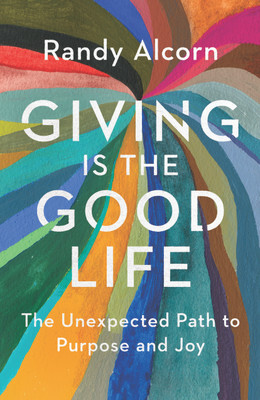 Giving Is the Good Life (Softcover)
Giving Is the Good Life (Softcover) 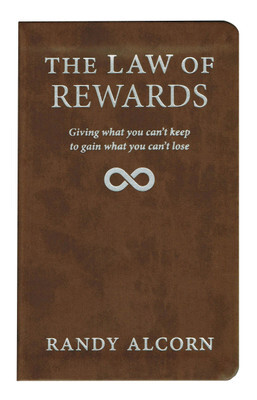 The Law of Rewards (Special Edition)
The Law of Rewards (Special Edition) 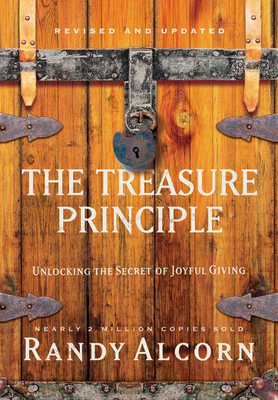 The Treasure Principle: Revised and Updated
The Treasure Principle: Revised and Updated
November 14, 2025
Are We Slow to Speak and Rush to Judgment on Social Media?

The human impulse to rush to judgment has always existed, but now it is common to believe whatever we hear and then post outrage using social media. But what if in our use of social media we applied the concepts of innocent until proven guilty, and from the mouth of Jesus, “Do to others as you would have them do to you”?
Though I’m not at all bitter about it, I remember well the harsh judgments from fellow Christians about my civil disobedience at abortion clinics (I don’t feel the pain anymore; I just remember its effects, especially on Nanci). Had there been social media in 1988-1990, trust me, I would have been skewered online not simply by unbelievers, but by many pastors and Christian leaders.
I was speaking to a group of pastors in 1990 when one of them raised his hand and asked, “Why do you go to abortion clinics and scream at women and spit on them and pull their hair?” When I told him I’d never done such a thing, and never would, I asked him, “Why would you believe the newspapers instead of coming to me as your brother in Christ and asking if it’s true?”
So even in those pre-internet days, there were times I was privately and in small groups discredited by people who had no clue what my motives were—but unless they read the papers, watched TV news, or overheard church people talking about it, my daughters didn’t have to hear it. Were it happening today and they were 10 and 12, it would be inescapable even if they weren’t yet on social media, because everyone would be talking about it.
However, I do remember one day our daughters attended a rescue with their mother and saw all that happened, including my arrest. The next morning, I read the newspaper’s account of the story. I handed it to my daughter Karina, who read every word. Stunned, she started crying. “Dad, this isn’t true. I was there the whole time. That’s not what happened!” Nothing I’d said to my children about the world’s lies and media distortions compared to the firsthand lesson learned from the newspaper that day.
In this age of social media, I’ve seen Bible-believing, Christ-centered people post thoughts online only to receive a string of hypercritical responses from people who wield Scripture verses like pickaxes, swiftly condemning the slightest hint of a viewpoint they consider suspicious. Others quickly join the fray, and soon it appears that no one has bothered to read what the blogger actually said. Responders assume the worst, not giving the benefit of the doubt and engaging in shotgun-style character assassination. If I were an unbeliever reading such responses, I certainly wouldn’t be drawn to the Christian faith.
I wonder why it’s not immediately recognized by those engaging in such behavior that what they’re doing is utterly contrary to the faith they profess and the Bible they believe. How is it that perpetual disdain, suspicion, unkindness, and hostility are seen as taking the spiritual high ground?
God calls us “to slander no one, to be peaceable and considerate, and to show true humility toward all men” (Titus 3:2). Here are some verses for us to reflect on as write and share online:
“Let every person be quick to hear, slow to speak, slow to anger” (James 1:19).
“Do you see a man who is hasty in his words? There is more hope for a fool than for him” (Proverbs 29:20).
“A fool takes no pleasure in understanding, but only in expressing his opinion” (Proverbs 18:2).
“Be not rash with your mouth, nor let your heart be hasty to utter a word before God, for God is in heaven and you are on earth. Therefore let your words be few” (Ecclesiastes 5:3).
“When words are many, transgression is not lacking, but whoever restrains his lips is prudent” (Proverbs 10: 19).
Recommended Reading
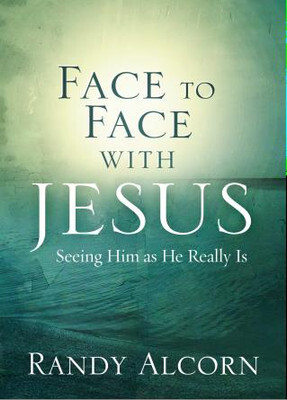 Face to Face with Jesus
Face to Face with Jesus 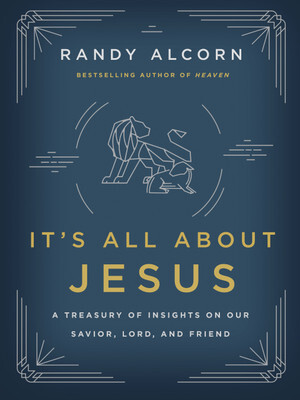 It's All About Jesus
It's All About Jesus 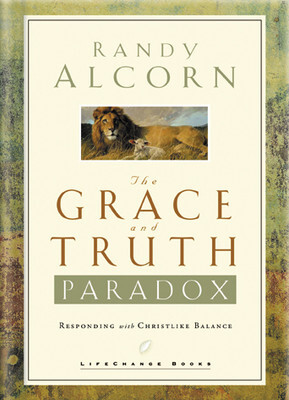 The Grace and Truth Paradox
The Grace and Truth Paradox
November 12, 2025
The Problem of False Advertising by Christian Colleges

Over twenty years ago, I wrote an article titled The Scandal of Evangelical Dishonesty. The subjects I addressed were uncomfortable and controversial, including the issue of false advertising by Christian colleges. But this problem has not gone away, and if anything, the situation is worse now than it was then.
Many Christian colleges and universities routinely print doctrinal statements in their catalogs that are not believed or taught by some or even many of their professors. Years ago, the academic vice president of a major Christian liberal arts college confided to me, “If Christian parents actually knew what their children are being taught in our classrooms, they would pull them out of college tomorrow.” And, I would add, they’d never give another dime to that college.
If Christian colleges told the truth in their promotional materials, some would read like this: “Thirty-four percent of our faculty believe in the inerrancy of God’s Word. Twenty-one percent of our science teachers believe the biblical account of creation. No one in our psychology department believes in the doctrine of original sin. Two out of our three sociology teachers are proabortion and defenders of homosexual lifestyles. The director of our philosophy department is an agnostic. The head of our Bible department hasn’t attended church for ten years because he doesn’t believe in organized religion.”
Why not be honest and admit this publicly? The answer is simple: So Christian parents will keep paying to send their students there, and so the college’s major Christian donors will keep sending money.
I am a great believer in Christian higher education. But the doctrinal statements published in many Christian colleges, including some at which I’ve spoken in the past, are simply false advertising (also known as lying). Much of the motive for this dishonesty boils down to money.
When students go to secular colleges, they and their parents should be prepared for the fact that most Christian beliefs will be argued against, marginalized and often ridiculed in classrooms. Many students are woefully unprepared to defend their faith, and end up abandoning it during their college years. But at least if they go to secular colleges, they have no illusions they’ll be taught Christian beliefs. They might have the opportunity to get involved with a Christian ministry to college students on their campus.
But many students go to Christian colleges assuming they will be taught biblical truths. They and their parents have the right to be told in advance what is actually taught at so-called Christian colleges. I implore parents to do their homework and find this out. I suggest you watch chapel messages, visit the campus, and go to some different classes and ask of yourself or others:
What is the atmosphere in the classrooms?
Are the professors committed to the infallible Word of God?
Is there a vibrant spiritual life among students and faculty? Are students and faculty involved in local churches?
If your goal is for your son or daughter to lose their faith, there are much cheaper ways to do this than sending them to “Christian” colleges that neither teach nor believe God’s Word!
Shortly after the article was originally published, a reader wrote me to say, “I work as a staff person at a Christian college, and have taken classes at the college. Some of the things the professors teach and expose these students to [are] horrible for their faith. I have seen students come in as freshman ready to serve Jesus, and leave four years later, jaded and their faith destroyed or they are seriously questioning it.”
The writer then shared this advice: “Parents, encourage your children to be strong in their faith. Pray for them. Send them encouraging letters in the mail, not email [or years later, I would add, by text]. (You have never seen such sad faces as those students who go to the mailbox and there is nothing there.) Encourage them to get into life groups and do a Bible study weekly with them.”
Also see my article Choosing a Christian College or Secular University.
November 10, 2025
To Be Like Jesus Is to Be Full of Grace and Truth

Many evangelical Christians are speaking grace without truth, while others are speaking truth without grace. But Scripture tells us this about Jesus: “And the Word became flesh and dwelt among us, and we have seen his glory, glory as of the only Son from the Father, full of grace and truth” (John 1:14).
“For the law was given through Moses; grace and truth came through Jesus Christ” (John 1:17).
Not 50% grace and 50% truth, but 100% of both. To be like Jesus is to be full of grace AND truth. So as Christ’s followers, shouldn’t that be our goal?
Truth hates sin. Grace loves sinners. Those full of grace and truth—those full of Jesus—do both.
“Hate the sin, but love the sinner.” No one did either like Jesus. Truth hates sin. Grace loves sinners. Those full of grace and truth—those full of Jesus—do both.
“‘Then neither do I condemn you,’ Jesus declared. ‘Go now and leave your life of sin’” (John 8:11).
Attempts to “soften” the gospel by minimizing truth keep people from Jesus. Attempts to “toughen” the gospel by minimizing grace keep people from Jesus. It’s not enough for us to offer grace or truth. We must offer both.
Grace without truth is not biblical grace, and truth without grace is not biblical truth.
When we offend everybody, often we’ve declared truth without grace. When we offend nobody, we’ve watered down truth in the name of grace.
The Pharisees were self-appointed gatekeepers who never emphasized grace. Christ’s hearers had seen truth in the law of Moses, but it was Christ who gave them their first clear view of grace. The law could only reveal sin. Jesus could remove it.
Some churches today embrace truth but need a heavy dose of grace. Other churches talk about grace but cry out for a heavy dose of truth.
Some time ago, after she had written to me with many criticisms, I invited a woman who was a lesbian and pro-abortion activist to lunch. For the first hour, she hammered me, telling of all the Christians who’d mistreated her. She seemed as hard as nails. I listened, trying to show her God’s grace, praying she’d see the Jesus she desperately needed. She raised her voice and cursed freely. People stared. But that was okay. Jesus went to the cross for her—the least I could do was listen.
Suddenly she was crying, sobbing, broken. I reached across the table and took her hand. For the next two hours I heard her story, her heartsickness, and finally, her doubts about the causes she championed. I told her about Christ’s grace.
After four hours we walked out of that restaurant, side by side. We hugged.
In our conversation, truth wasn’t shared at the expense of grace, or grace at the expense of truth.
Last I knew, this woman was walking with Jesus. I think of her sometimes when I’m trying to do the difficult but Christlike thing: speaking to people with both grace and truth.
Recommended Reading
 The Grace and Truth Paradox
The Grace and Truth Paradox
November 7, 2025
A Spiritual Body Will Still Be a Body

We can know a lot about our resurrection bodies. Why? Because we’re told a great deal about Christ’s resurrected body, and we’re told that our bodies will be like his.
“Beloved, we are God’s children now; it does not yet appear what we shall be, but we know that when he appears we shall be like him, for we shall see him as he is” (1 John 3:2, RSV).
“Just as we have borne the likeness of the earthly man, so shall we bear the likeness of the man from heaven” (1 Corinthians 15:49).
Though Jesus in His resurrected body proclaimed that he was not a ghost (Luke 24:39, NLT), countless Christians think they will be ghosts in the eternal Heaven. I know this because I’ve talked with many of them. They think they’ll be disembodied spirits, or wraiths. The magnificent, cosmos-shaking victory of Christ’s resurrection—by definition a physical triumph over physical death in a physical world—escapes them.
If Jesus had become a ghost, there would have been no resurrection, and redemption would not have been accomplished. But Jesus was not a ghost; He walked the earth in His resurrection body for forty days, showing us how we would live as resurrected human beings. In effect, He also demonstrated where we would live as resurrected human beings—on Earth. Christ’s resurrection body was suited for life on Earth. As Jesus was raised to come back to live on Earth, we, too, will be raised to come back to live on Earth (1 Thessalonians 4:14; Revelation 21:1-3).
The risen Jesus walked and talked with two disciples on the Emmaus road (Luke 24:13-35). They asked Him questions; He taught them and guided them in their understanding of Scripture. Though they didn’t know it was Jesus until “their eyes were opened” (v. 31), suggesting that God prevented them from recognizing Christ, they saw nothing different enough in His appearance to suggest that His resurrected body looked any different from a normal human body. In other words, they perceived nothing amiss. They saw the resurrected Jesus as a normal, everyday human being. The soles of His feet didn’t hover above the road—they walked on it.
We know that the resurrected Christ looked like a man because Mary called Him “sir” when she assumed He was the gardener at the tomb (John 20:15). Jesus spent remarkably normal times with His disciples after His resurrection. Early one morning, He “stood on the shore” at a distance (John 21:4). He didn’t hover or float—or even walk on water, though He could have. He called to the disciples (v. 5). He started a fire, and He was already cooking fish that He’d presumably caught Himself. He cooked them, which means He didn’t just snap His fingers and materialize a finished meal. He invited the disciples to add their fish to His and said, “Come and have breakfast” (John 21:12).
On another occasion, Christ suddenly appeared in a locked room where the disciples were gathered (John 20:19). His body could be touched and clung to and could consume food, yet it could apparently “materialize” as well. How is this possible? Could it be that a resurrection body is structured in such a way as to allow its molecules to pass through solid materials or to suddenly become visible or invisible?
We shouldn’t assume that Christ’s body will look exactly as it did before His death and resurrection, or that our bodies will look exactly as they do now. During Christ’s transfiguration, the appearance of His face changed, and His clothing “became as bright as a flash of lightning” (Luke 9:29). Likewise, Elijah and Moses are described as appearing “in glorious splendor” (Luke 9:31).
Christ may literally shine in His Kingdom on the New Earth. John says of the city, “The Lamb is its lamp” (Revelation 21:23). Christ appeared to Paul and blinded him on the road to Damascus (Acts 9:3-9).
Likewise, Scripture promises us that “the righteous will shine like the sun in the kingdom of their Father” (Matthew 13:43), and “will shine brightly like the brightness of the expanse of heaven . . . like the stars forever and ever” (Daniel 12:3, NASB).
Once we understand that Christ’s resurrection is the prototype for the resurrection of mankind and the earth, we realize that Scripture has given us an interpretive key to understanding human resurrection and life on the New Earth. Shouldn’t we interpret passages alluding to resurrected people living on the New Earth as literally as those concerning Christ’s resurrected life during the forty days He walked on the old Earth?
When Paul speaks of our resurrection bodies, he says, “The body that is sown is perishable, it is raised imperishable; it is sown in dishonor, it is raised in glory; it is sown in weakness, it is raised in power; it is sown a natural body, it is raised a spiritual body. If there is a natural body, there is also a spiritual body” (1 Corinthians 15:42-44).
When Paul uses the term spiritual body (v. 44), he is not talking about a body made of spirit, or a nonphysical body—there is no such thing. A body, by definition, is physical—flesh and bones. The word spiritual here is an adjective that describes the body; it doesn’t negate its meaning. A spiritual body is first and foremost a real body or it would not qualify to be called a body. If our bodies became spirits, Paul could have simply said, “It is sown a natural body, it is raised a spirit,” but that’s not what he says. Judging from Christ’s resurrection body, a spiritual body looks and acts like a regular physical body most of the time, but it may have (and in Christ’s case it does have) some physical abilities beyond what is currently normal.
In this video, I share a quote from N.T. Wright about how the term “spiritual body” is often misunderstood:
https://www.youtube.com/watch?v=KeQ_Xy1t6EE
Many of us look forward to Heaven more now than we did when our bodies functioned well. Inside your body, even if it is broken or failing, is the blueprint for your resurrection body. You may not be satisfied with your current body or mind—but you’ll be forever thrilled with your resurrection upgrade.
Recommended Reading
 50 Days of Heaven (Special Edition)
50 Days of Heaven (Special Edition)  Heaven
Heaven  The Promise of the New Earth
The Promise of the New Earth



